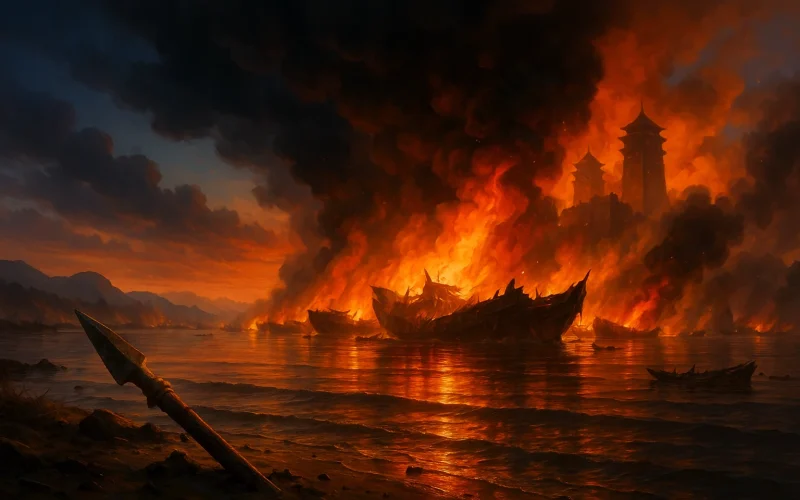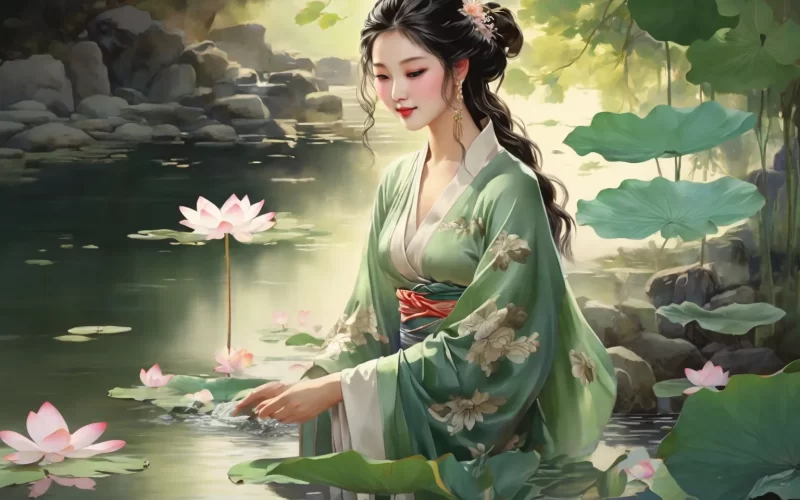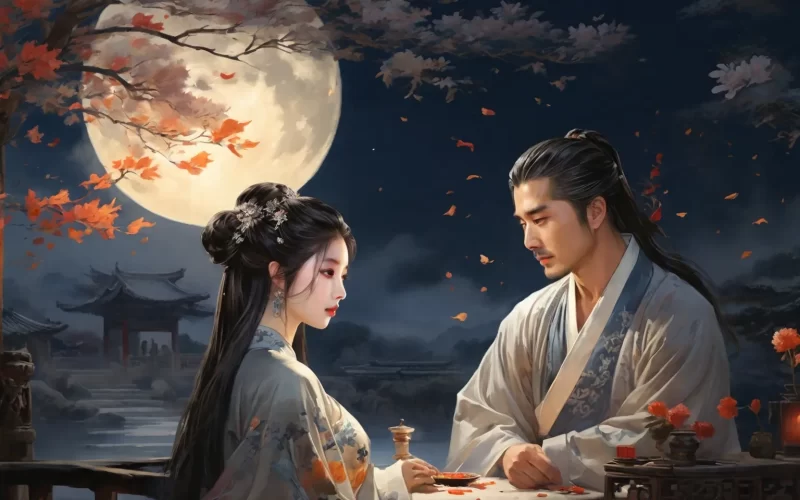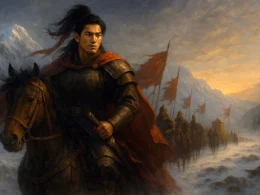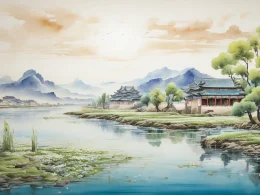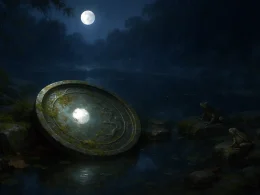On a part of a spear still unrusted in the sand
I have burnished the symbol of an ancient kingdom...
Except for a wind aiding General Zhou Yu,
Spring would have sealed both Qiao girls in CopperBird Palace.
Original Poem:
「赤壁」
杜牧
折戟沉沙铁未销,自将磨洗认前朝。
东风不与周郎便,铜雀春深锁二乔。
Interpretation:
"Reflections at Red Cliff" was written around 840 AD during the Huichang era of Emperor Wuzong of the Tang Dynasty. At the time, Du Mu was traveling to his new post as the governor of Qi'an Prefecture (modern-day Huanggang, Hubei). Passing by the historic battlefield of Red Cliff, he was moved by the scenery and composed this poem. Using the Battle of Red Cliff as a theme, Du Mu reflects on the unpredictability of history and the frustrations of unrecognized talent, weaving historical allusions into his personal reflections on heroism and the passage of time.
First Couplet: "折戟沉沙铁未销,自将磨洗认前朝。"
Zhé jǐ chén shā tiě wèi xiāo, zì jiāng mó xǐ rèn qián cháo.
A broken halberd lies buried in the sand, its iron not yet rusted away. I retrieve it, clean it, and recognize it as a relic of a bygone era.
The poem begins with the discovery of a broken halberd, a symbol of war, buried in the sand. The fact that the iron has not completely rusted suggests that the traces of history remain intact. By cleaning and examining the halberd, Du Mu engages in an act of historical inquiry, setting the stage for his reflections on the past. This couplet grounds the poem in a tangible object, linking the present to the distant past.
Second Couplet: "东风不与周郎便,铜雀春深锁二乔。"
Dōngfēng bù yǔ Zhōu Láng biàn, tóng què chūn shēn suǒ èr Qiáo.
Had the east wind not favored Zhou Yu, the Bronze Bird Tower would have locked away the two Qiaos in the depths of spring.
This couplet employs a hypothetical scenario to highlight the role of chance in history. During the Battle of Red Cliff, Zhou Yu's victory over Cao Cao was aided by a timely east wind, which allowed him to use fire to destroy Cao's fleet. Instead of praising Zhou Yu's strategic brilliance, Du Mu emphasizes the role of the east wind, suggesting that success often depends on external factors beyond one's control.
The "Bronze Bird Tower" refers to a structure built by Cao Cao to house his concubines, and the "two Qiaos" were famous beauties of the time. By mentioning them, Du Mu not only alludes to Cao Cao's ambitions but also intertwines the brutality of war with the tragic fate of these women, adding a layer of poignancy to the poem.
Overall Appreciation
This poem uses the discovery of a broken halberd to reflect on the Battle of Red Cliff and the broader themes of heroism, fate, and the passage of time.
The first couplet, with its focus on the halberd, serves as a tangible link to the past, inviting the reader to ponder the remnants of history. The act of cleaning and recognizing the halberd symbolizes Du Mu's reverence for the heroes of the past and his desire to understand their legacy.
The second couplet shifts to a hypothetical scenario, emphasizing the role of chance in historical outcomes. By attributing Zhou Yu's victory to the east wind rather than his own brilliance, Du Mu critiques the idea that success is solely the result of individual talent. This perspective reflects his own frustrations with the unpredictability of fate and the challenges of achieving recognition in a turbulent world.
The famous line, "东风不与周郎便,铜雀春深锁二乔。" masterfully blends historical narrative with emotional depth. The allusion to the two Qiaos transforms the cold facts of history into a poignant meditation on the fragility of human lives and the far-reaching consequences of war.
The poem's tone is contemplative and tinged with melancholy, as Du Mu grapples with the uncertainties of history and his own place within it. While the poem does not explicitly criticize contemporary society, its reflections on the unpredictability of success and the fleeting nature of glory resonate deeply with the poet's personal struggles.
Writing Characteristics
- Object as a Starting Point, Emotion in Scenery
Du Mu uses the broken halberd as a focal point, grounding his reflections in a tangible object and using it to bridge the past and present. - Skillful Use of Allusion, Concise and Profound
The poem incorporates historical allusions like the "east wind," "Bronze Bird Tower," and "two Qiaos" to enrich its meaning, conveying complex ideas with few words. - Hypothetical Approach, Unique Perspective
By imagining an alternate outcome for the Battle of Red Cliff, Du Mu highlights the role of chance in history, offering a fresh and thought-provoking perspective. - Deep Emotion, Subtle Expression
While the poem appears to be a simple reflection on history, it subtly conveys Du Mu's frustrations with unrecognized talent and the unpredictability of fate.
Insights
This poem uses historical events to explore profound truths about human life. By attributing Zhou Yu's victory to the east wind, Du Mu suggests that even the most talented individuals may fail without the right opportunities. The poem reminds us that while hard work and ability are important, timing and external circumstances also play a crucial role in success.
Furthermore, the poem's allusion to the two Qiaos serves as a poignant reminder of the human cost of war. Through its blend of historical narrative and emotional depth, the poem encourages us to reflect on the fragility of life and the far-reaching consequences of our actions.
Ultimately, "Reflections at Red Cliff" is not just a meditation on history but also a timeless exploration of the interplay between talent, opportunity, and fate. It challenges us to consider how we navigate the uncertainties of life and strive to make our mark in a world where success is never guaranteed.
Poem translator:
Kiang Kanghu
About the poet:
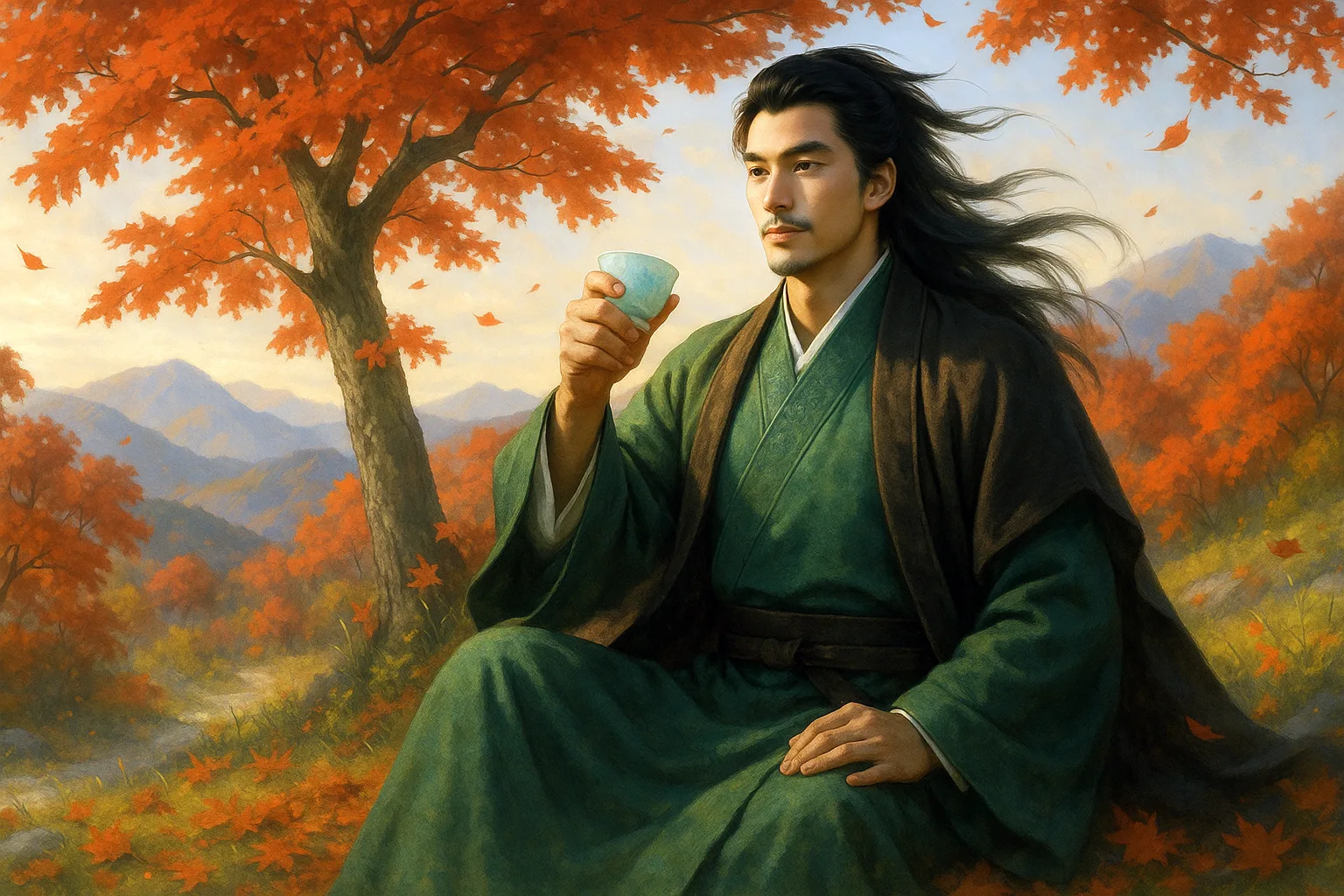
Du Mu (杜牧), 803-853 AD, was a native of Xi'an, Shaanxi Province. Among the poets of the Late Tang Dynasty, he was one of those who had his own characteristics, and later people called Li Shangyin and Du Mu as "Little Li and Du". His poems are bright and colorful.






